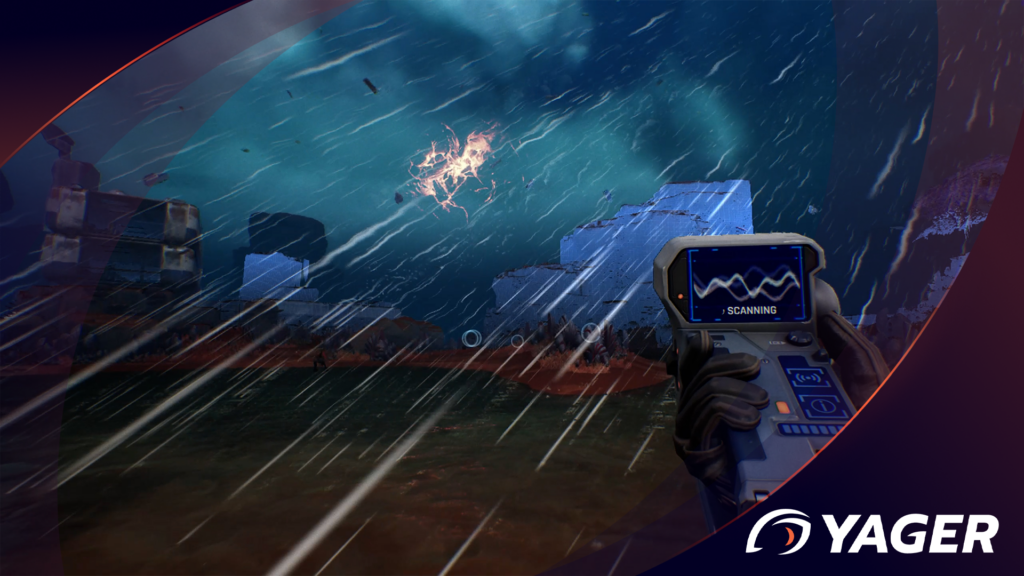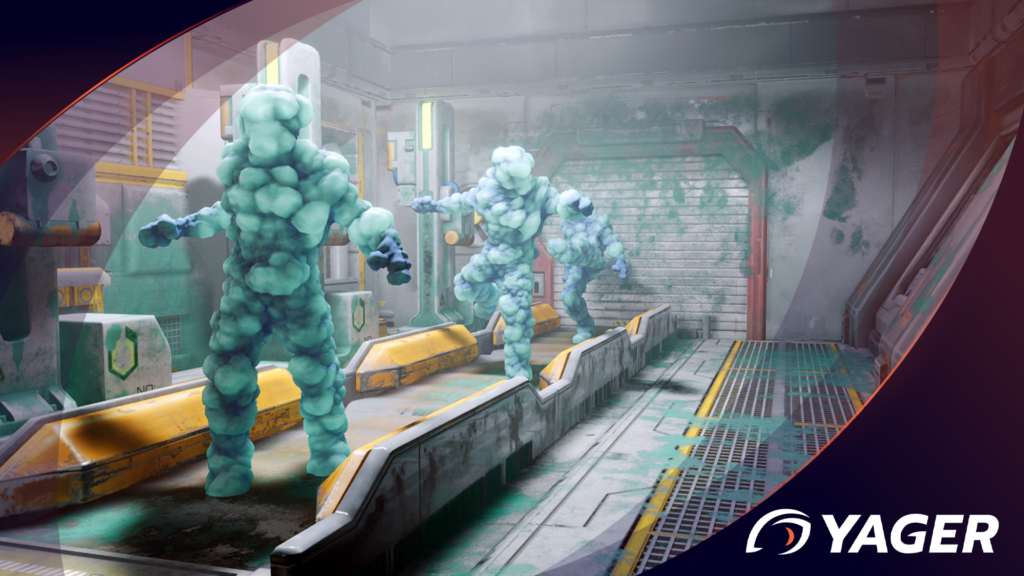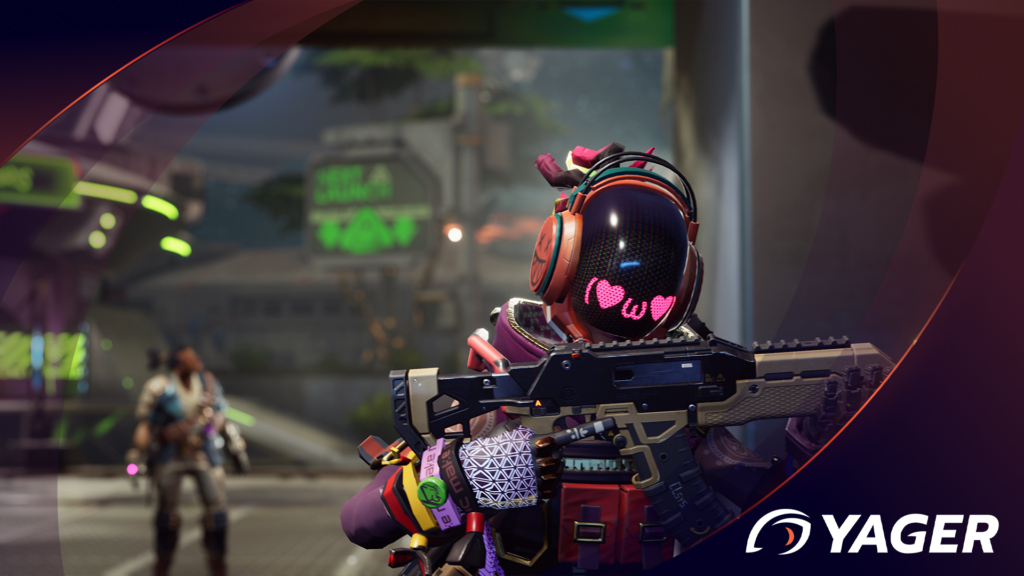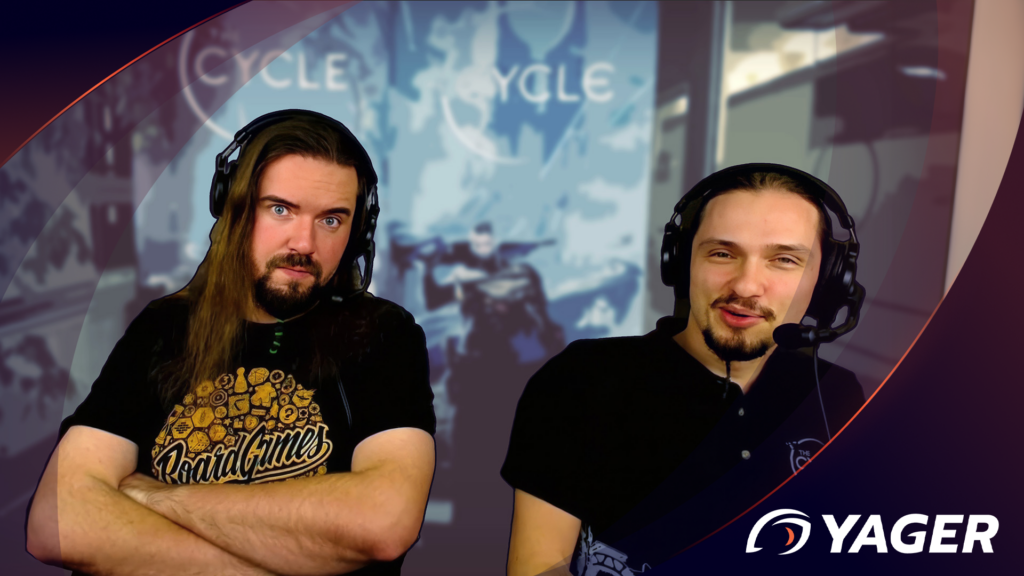Hi folks,
In today’s blogpost, I will talk about Community Management in gaming and some of the trials and tribulations that one might encounter being a Community Manager or if you are part of a gaming community.
Let me introduce myself first, I am Floh. (Left in the picture, together with Game Designer Yev)
Some of you might know me as Feralus, some as FeraFlox. I have been working in Community Management and Player Support for 10 years and joined YAGER in October 2019, after having worked on several F2P games on PC & mobile. I am the Community & Player Support Lead at YAGER.
Let us look at the term “community” first. A community exists of several parts, some bigger, some smaller and some even fragmented within themselves. Let’s take a look at some of the parts: You have the most vocal hardcore players that are usually the players you talk with daily. You have a – usually – silent majority. You have content creators, that then have their own communities on top.
When it comes to feedback, there is rarely “THE community” but rather different parts of the community with different interests, needs and levels of interactivity. Some are not active in social media platforms; they would rather fill out surveys or give you a review. Some are posting on discord to their hearts’ content, trying to draw as much attention to their opinions as possible. Some even create content around your game or for their communities.

Listening to all of them, filtering their feedback, communicating with them are big parts of the job of a Community Manager, a CM.
Community Management serves as the backbone of any thriving gaming community, fostering growth, inclusivity, and positive engagement.
As a Community Lead with a decade of experience, I have the privilege of spearheading these efforts at YAGER, where our goal is clear:
Develop, foster, and manage a growing community that welcomes everyone while excluding hatred and intolerance.
How do we achieve that at YAGER? Well, I outlined some key points important for us when handling a community. These key points are also part of our internal community goals.

Community Advocate & Facilitator
As Community Managers, we act as advocates for the community while balancing the interests of the project. It is not about “us vs them,” but rather “us and them” working together for the greater good. You sit between the two chairs and always keep both interests in mind, while of course never forgetting the product vision and mission.
By maintaining this delicate balance, we create a nicer atmosphere for meaningful communication and reduce heated arguments within the community.
Open communication and getting players on board is one of the big strengths that we have here at YAGER and our approach to handling a community.
This also includes ensuring that possible external partners working with us, like player support teams, feel like they are part of the community team and can offer the best support possible due to them being aligned with your goals, rules, and ideas.
Community Internal Culture Setting
Community Managers are responsible for establishing the rules and guidelines that govern the community they build. They must be both leaders and team players, creating policies, fostering discipline, and ensuring every member feels valued. It is essential to align these rules with the values of the company and the unique aspects of the project.
This involves a comprehensive approach that considers both social conduct and in-game behavior. One thing that helps is to empower community members who embody our values as moderators on platforms like Discord, Twitch, Reddit, and Steam. This is crucial for maintaining a welcoming environment while firmly excluding hatred and intolerance. Without moderators it is hard to take care of big communities, so you need a reliable team.
There’s an important caveat – It is a hobby for them, while they can gain valuable experience when it comes to working with communities, moderators are not your colleagues or subordinates, they are volunteer helpers that you should take good care of! As with your own mental health, their mental health is especially important, and it is not a negative thing to remind them every now and then that moderation is and should be treated as a hobby.
Creating a robust set of guidelines not only ensures a positive and inclusive atmosphere but also provides a framework for addressing issues such as toxicity and cheating, which are detrimental to community health. If you build your community right you also strengthen its members to enforce these rules, fostering a sense of ownership and responsibility among the community without necessarily being moderators.

Frontline Communications Management
We also protect the game and its team and brand without censorship.
If you do not overstep any boundaries that we set in our rules for our community, you are welcome to take part in all discussions around our games
Managing negative feedback and criticism with openness and understanding fosters an environment of open thought and idea exchange. This plays a vital role in safeguarding the mental health of our colleagues, because as Community Managers, we act as a filter for feedback, ensuring that constructive criticism reaches the appropriate teams while shielding our colleagues from unnecessary toxicity.
This approach promotes a healthier work environment for all involved and helps to maintain the brand image, while also improving the game. Furthermore it also improves the general atmosphere of the community.
Analysis & Improvements
Capturing feedback from the community and reporting it to the responsible teams is essential for driving improvements. This includes bug reporting, feedback analysis, and proactive discussions to address community pain points. As the role of Community Managers evolves, continuous learning and adaptation are key to meeting the community’s needs.
As a Community Lead, it is good to either be part of the project leadership team or have a close connection to the members of said team. This can help massively to bring up issues and pain points in a community and supports the creation of actionable feedback items.
One of the most important tools we have at our disposal is a sentiment tracker. While it is good to address hot topics in a timely manner, it is also important to keep the bigger picture in mind. Data is important, cause if a loud minority complains about a feature and the overall sentiment of said feature is positive, is it really something that should be acted on?
We must make sure that the Game Designers and Artists can do their work in the best way possible, they are the specialists in their field, and we can address issues, but we cannot (and should not) solve them. Data is a crucial part of giving feedback, as it is not helpful for the game, nor healthy for the community to only act on things like “I have just seen this in a stream” or “Someone said this, it must be critical,” while it might be an absolute outlier.

Community Growth
Close interaction with players is vital for community growth. From curating content to engaging thought leaders within the community, our efforts extend to social media channels, guided by brand guidelines while maintaining a personalized tone. Players are interacting with humans and not a corporate machine.
By nurturing these connections, we ensure a warm and welcoming environment for gaming fans from diverse backgrounds.
With a healthy and growing community, you can also start initiatives that further support said growth and strengthen the trust between players and community team as well as players and brand.
This includes for example test groups, so players can get their hands on patches first, to give smart feedback about their experience. When you do this, it is important to make sure that you include players with different playstyles and backgrounds, as you want to keep the segments of the community in mind.
This can then lead to the creation of a player council, which offers even more direct feedback avenues and offers a place for very direct and open communication.
Attending offline events or having community meetups is another great option that can lead to positive experiences for all sides involved.
By prioritizing the points outlined above and coupling them with a great product, Community Managers can drive community growth and foster a welcoming space for gaming enthusiasts.
At YAGER, we are deeply committed to our core values, which guide every aspect of our work:
- We connect, understand, and shape experiences — Where real interest meets smart decisions.
- Belonging is key. We listen, adapt, and create a safe environment for all. Only then diversity makes us succeed.
- We are committed to being excellent. Turning feedback into action helps us get better in ourselves and our games.
- With ownership and integrity, we value honesty and taking initiative — Guiding our commitment to impactful solutions with accountable actions.
Together, we can continue to shape and nurture vibrant gaming communities that embrace diversity and inclusivity.

